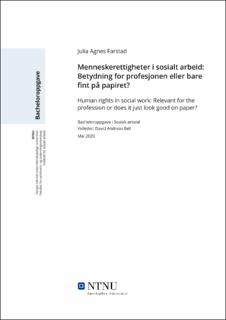| dc.contributor.advisor | Bell, David Andreas | |
| dc.contributor.author | Farstad, Julia | |
| dc.date.accessioned | 2021-09-28T18:49:18Z | |
| dc.date.available | 2021-09-28T18:49:18Z | |
| dc.date.issued | 2021 | |
| dc.identifier | no.ntnu:inspera:79529603:35206879 | |
| dc.identifier.uri | https://hdl.handle.net/11250/2785821 | |
| dc.description.abstract | Norge er anerkjent for å være et land med jevne inntektsfordelinger og en sterk velferdsstat. Det har likevel vært økende inntektsforskjeller i Norge de siste tiårene. Det er flere barn som vokser opp i fattigdom og det er flere som står uten bolig. Dette til tross for at både det å ha en tilfredsstillende levestandard og å ha en bolig er en menneskerettighet. Hva har dette å si for sosialt arbeid? Og hvordan henger menneskerettighetene sammen med ressursfordelingen i samfunnet? Sosialarbeidere er forpliktet gjennom yrkesetikken å arbeide i tråd med menneskerettighetene, og en rettferdig fordeling av samfunnet er et sentralt mål for profesjonen. Oppgaven søker å belyse et hittil lite utforsket område, nemlig hvilken rolle de menneskerettighetene spiller for sosialt arbeid i Norge. Med utgangspunkt i spørsmålet utforskes menneskerettighetenes betydning for sosialpolitikk, nasjonal lovgivning og sosialt arbeids praksis. Det argumenteres for at menneskerettighetene spiller en sentral rolle både for hvordan sosialt arbeid blir utført og for de områdene sosialarbeidere jobber i. I tillegg viser oppgaven hvordan menneskerettighetene har mulighet til å veilede profesjonen i en stat preget av reorganisering og økende ulikhet. Ved å gi staten forpliktelser har menneskerettighetene potensialet til å skape et samfunn hvor sosiale problemer som ulikhet, fattigdom og arbeidsløshet blir sett på som menneskerettighetsbrudd istedenfor å bli ansett som problemer med enkeltpersoner. Målet med oppgaven er å gi en økt forståelse av sammenhengen mellom sosialt arbeid og menneskerettighetene ved å vise hvordan oppfyllelsen av disse kan prege sosialt arbeid i Norge. | |
| dc.description.abstract | Norway is recognized as a country with even income distributions and a strong welfare state. Nevertheless, there have been increasing income disparities in Norway in recent decades. There are more children growing up in poverty and there are still people who are homeless. This is despite the fact that both having an adequate standard of living and housing is a human right. What does this have to say for social work? And how do human rights relate to the distribution of resources in society? Social workers are obliged through professional ethics to work in accordance with human rights, and a fair distribution of society is a key goal for the profession. This thesis discusses the role that human rights play in social work in the Norwegian welfare state. This is explored through the discussion of how human rights have an impact on social policy, national legislation and social work practice. It is argued that human rights play a central role both in how social work is carried out and in the landscape in which social workers work. In addition, the article shows how human rights have the opportunity to guide the profession in a state characterized by reorganization and growing inequality. By giving the state obligations, human rights have the potential to create a society where social problems such as inequality, poverty and unemployment are seen as human rights violations instead of as problems with individuals. The aim of the thesis is to provide an increased understanding of the connection between social work and human rights by showing how the fulfillment of these can affect social work in Norway. | |
| dc.language | nob | |
| dc.publisher | NTNU | |
| dc.title | Menneskerettigheter i sosialt arbeid: Betydning for profesjonen eller bare fint på papiret? | |
| dc.type | Bachelor thesis | |
